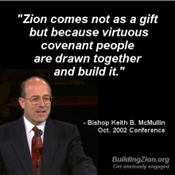
Is there a better way than capitalism? Sure, the prophets have long taught of a superior way, the way of consecration, stewardships, and living unitedly.
Here are some helpful insights from Jesse Fisher, author of “Champions for Zion” (buildingzion.org) on teachings of early LDS leaders on building Zion. Due to his extensive studies on Zion, Jesse is a wealth of knowledge on the subject.
Question: What about capitalism, is it always the best way?
Answer: I’m all for free markets, as was Brigham. But he and John Taylor both believed that unbridled Capitalism leads to a concentration of wealth and then a corruption of government. So they both sought means of, not a redistribution of wealth, but a redirection of wealth’s power to the benefit of the community instead of just increasing the wealth of the Capitalists even further beyond their own needs.
Both leaders made attempts to get the successful businessmen to create co-ops to employ the Saints and to fill local needs. Redirected their expertise to blessing the lives of others, rather than just get richer.
John Taylor went so far as to create the Zion Central Board of Trade to accomplish this. And link to the Wikipedia listing here:
https://en.wikipedia.org/wiki/Zion’s_Central_Board_of_Trade
Question: In Zion we don’t rely on Babylon. So should we all be farmers? Can we pull that off?
Answer: Remember, until the 20th century, around 90% of people had to be farmers. Now that we have better understanding of agricultural principles, it will be easier to grow more food with fewer people.
Question: Do you think we have enough Craftsman these days or should every Zion aspiring member learn how to use a trowel, etc.?
Answer: We definitely will need all the craftsmen’s skills in the future. Sadly, a lot of the old wisdom has been lost.
Question: With all the work of independent living, does that eliminate time for the arts?
Answer: The history of Salt Lake belies the idea that Brigham thought we should leave the arts behind. In fact, just the opposite was true. The Pioneer theatre was one of the earliest buildings built! He actually encouraged fine arts.
Question: The Book of Mormon says the teachers had a day job, and taught (the gospel) on the side. How does that principle look in a united community?
Answer: I think that principle should apply to government as well as to education. Volunteers, not profiteers.
Question: What are you doing to start building Zion economically in your life?
Answer: I’m involved in building what for me is a pre-Zion community — Riverbed Ranch. As the marketing manager, I don’t talk about Zion in our ads or public discussions — we just say that we’re an agricultural co-op. In my book, you’ll discover that the early LDS leaders taught that cooperation is a stepping stone to Zion.
Riverbed Ranch is being built by the Utah OSR Land Cooperative, an agricultural co-op organized under Title 3 of the Utah Code. The goal is to provide all its shareholders land where they can produce all their own food, water and power. The co-op also encourages its members to organize in “sub co-ops” to fulfill other needs (like education). I see this cooperative community as a learning experience as we move towards a Zion society. Sadly, we all inadvertently bring our babylonian values along with us. So, it’s not without its drama.
Ideally, we’d all be working for worker-owned co-ops, earning sufficient for our needs and just wants.
You could check IC.org, they list all the intentional communities (and communes) all around the country.
Note: Jesse suggests this talk as a favorite for learning about Zion’s core principles by Wilford Woodruff, it contains nearly all the core teachings of early LDS leaders about what is involved in building Zion:
https://buildingzion.org/historical/wilford-woodruff-on-building-zion.pdf
And a more recent address which also highlights some of these principles: https://www.churchofjesuschrist.org/study/general-conference/2006/04/zion-in-the-midst-of-babylon?lang=eng

